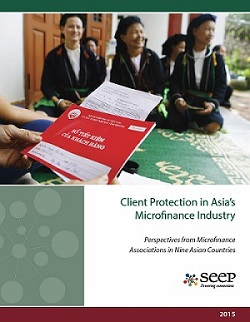2015 | The SEEP Network

This report summarizes client protection (CP) policies and practices in nine microfinance markets in Asia: India, Pakistan, the Philippines, Myanmar, Cambodia, Bangladesh, Nepal, Sri Lanka, and China. The findings in this report have been gleaned from assessments conducted by the national microfinance associations in these countries from August to November 2014, using the SEEP Client Protection Market Diagnostic Tool. This tool is based on the CGAP methodology used to conduct CP diagnostic exercises in various countries and uses the Smart Campaign’s Client Protection Principles as a reference.
The results offer a multi-country perspective on legal frameworks and industry practice in five areas related to CP in financial services: Price transparency, fair treatment of clients, protection mechanisms for borrowers and depositors, recourse mechanisms, and client data protection.
Diversity in market contexts, product availability, types of providers covered by the participating associations, and differences in regulations for different provider types notwithstanding, an analysis of associations’ responses provides the following findings:
1. Client Protection Overview
2. Price Transparency
3. Fair Treatment of Clients
4. Protection of Borrowers and Depositors
5. Recourse Mechanisms
6. Data Protection
The results showed many achievements in the area of CP in the countries that were in the study. They also reveal however that some key areas need improvement of both legal frameworks and industry practice across countries, including fair treatment of clients, price transparency for deposits and other products such as insurance, promotion of usage of grievance mechanisms, and protection of clients’ data and information.

1621 North Kent Street, Ste 900,
Arlington, VA, 22209
P 202.534.1400
F 703.276.1433
Website Photos: © mari matsuri
